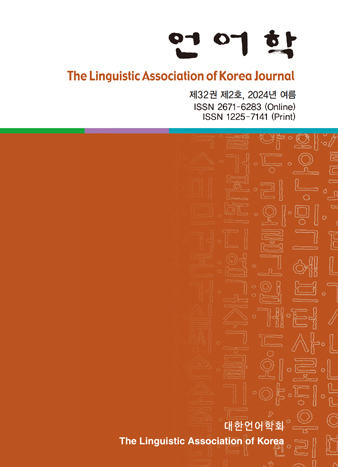대한언어학회 전자저널
32권 2호 (2024년 6월)
- Teaching Methods for Turkish Learners of Korean Based on Contrastive Analysis: Focus on Long Term Memory Effect and Student Questionnaires
-
Soyoung Yang
Pages : 121-152
Abstract
Yang, Soyoung. (2024). Teaching methods for turkish learners of Korean based on contrastive analysis: Focus on long term memory effect and student questionnaires. The Linguistic Association of Korea Journal, 32(2), 121-152. In order to develop an effective teaching method in the perspective of contrastive analysis on Korean and Turkish, the two languages were contrasted and categorized into six contrastive types. Effective teaching methods for each contrastive type were analyzed according to the experimental group(Translation teaching methods) the Consecutive translation and Back-translation teaching methods and the control groupthe Focus on Form teaching method, as well as the learners' evaluation of all three. After the experimental lecture, the first examination test was conducted and two weeks later, on the second examination test, it was found that the two Translation teaching methods (Consecutive Translation, Back Translation) were effective for long-term memory of 'Korean same as Turkish' type. However, had a negative effect on type of 'Absent in Turkish, present in Korean'. Type of One Turkish corresponding to many in Korean has the highest importance and learning priority and type of Absent in Turkish but split in Korean holds the highest in the learning difficulty hierarchy among the types. InOne Turkish corresponding to many in Korean type and the below average scoring group of Absent in Turkish but split in Korean type, the Back Translation and Focus on Form methods were effective for long-term memory. For types of Korean different from Turkish' and Absent in Turkish, present in Korean, the Focus on Form method was effective for long-term memory. According to the student evaluations of the experimental lecture, students preferred input learning in the Back Translation method, and preferred output learning in the Focus on Form method.
Keywords
# contrastive types # consecutive translation # back translation # focus on form method # long-term memory
References
- Altundağ, P., & Yang, S.-Y. (2021). Yabancı dil olarak Korece Öğretiminde Sözcük Öğretimi. Türkiye’de Kore Çalışması, APAM, 247-264.
- Brown, H. D. (2007). Principles of Language Learning and Teaching. 5th edition. New York: Pearson Education Press.
- Eşsiz, D. (2020). Teokiin haksipjaril uihan hanguko gamjeongpyohyen ohui gyouyk yeongu, ('Study on education of Korean emotional words for Turkish learners'). Unpublished doctoral dissertation, Seoul National University. Seoul, South Korea.
- Gökmen, M. E. (1999). Ejungeonohakgwa dejoeonohah('A Study on Assimilation Rules of Turkish Learners'). Ejungeonohak. 16, 53-60.
- Han, J.-H. (2003). Ilbonokwon hanguko haksipjayi oryuhyeonsangbunseok, ('Analysis on the Errors Made by Japanease Learners of Korean'). Unpublished master's thesis, Hanyang University. Seoul, South Korea.
- Hideki, N. (2002). Hanguko munbeop gyoyukyi serowun jeongeril wuihaye ('For the Development of Korean Grammar Education'). Wegukorosoyi Hanguko Gyouyk, 27, 83-101.
- Kim, J.-Y. (2011), Janggi giok geonryakeu noigwahakjeok ehewa gyoyukjeok sisajeom (‘Brain-Scientific understanding of longterm memory strategies and educational implications’). Unpublished master's thesis, Seoul National University of Education. Seoul. South Korea.
- Kim, S.-Y. (2018). Sujunbyeol haksipjaui jamggigioke michinin yeongo ohuihaksip bangbopyi hyogwasong ('Effect of Vocabulary Learning Strategy on Learners’ Long Term Memories Depending on Levels: Context-based Vocabulary Learning Strategy vs. Definition-Translation Vocabulary Learning Strategy'). Unpublished master's thesis, Yonsei University. Seoul. South Korea.
- Korkmaz, M. E., & Cho, E.-S. (2018). Hangukoyi 'e, eso' e deyingdoinin teokioyi busagyokcosa dejoyeongu ('A Comparative Study of Turkish Adverbial Cases Corresponding Korean ‘-e’ and ‘-esoe’). Eoneosasilgwa Ganjeom, 44, 125-145.
- Lim, J.-Y., & Park, D.-Y. (2016). Teokyin hanguko haksipcayi josa 'yil/ril' e dehan sayong yangsang bunsok mit gyosuhaksipbangan ('Analysis the Usage of Korean Particle ‘-eul/reul’ and Teaching Learning Methods-Focusing on Turkish Learner-'). Seguko Gyoyuk, 0(108), 289-323.
- Oller, J. W., & Ziahosseiny, S. M. (1970). The contrastive analysis hypothesis and spelling errors. Language Learning, 20, 183-189.
- Park, C.-H., & Lee, K.-H. (2021). Mogukoril whalyonghan malhagi suopi oegukin haksipcayi malhagi hyoninggame michinin hyogwa yeongu ('A study on the effect of speaking classes using the native language on the speaking efficacy of foreign learners-Focused on Vietnamese language learners-'). Chungram Eomungyouyk, 83, 69-95.
- Türközü, S. G. (2010). Tongsamyeoneso hangukowa tokioyi dejobunsok mit hanguko ilgicaryooryubunsok. CEESOK Journal of Korean Studies, 11, 7-30.
- Yang, M.-H. (2018). Hyeongte chojum copg1nbopy1l ceokyonghan hanguko munbop gyosu haks1p bangbop y1ongu ('Research on the Teaching- learning Method of Korean Grammar using Focus on Form Approach for Chinese learners of Korean as a Foreign Language'). Unpublished doctoral dissertation, Inha university. Incheon, South Korea.
- Yang, S.-Y. (2013a). Teokiin hangukohaksipcayi cakmun oryubunsok ('The Analysis of the Turkish Learner's Errors in Korean Writing - Through the contrastive Analysis of Korean and Turkish'). Unpublished master's Thesis, Chungbuk National University. Chongju, South Korea.
- Yang, S.-Y. (2023). Korean Teaching Order and Teaching Factors according to Contrastive Types of Turkish and Korean. Unpublished doctoral dissertation, Ankara University. Ankara. Turkiye.
